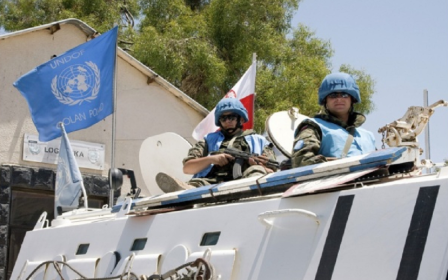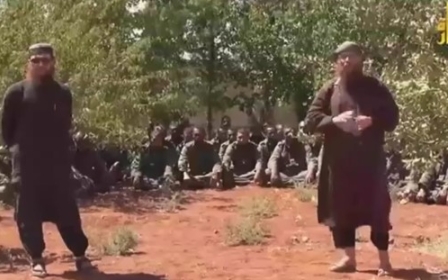Golan unrest spells militant threat for Israel's Syria borders

Fighting in the Golan Heights has flared up in August when militants linked to Al-Qaeda affiliated Nusra Front took control of the strategic Quneitra border crossing, consolidating rebel control by kicking the Syrian army out of the area and placing militants on Israel’s doorstep.
The Syrian militants reportedly made fresh advances near the Israeli-occupied Golan Heights on Sunday where 26 troops and 17 militants were killed in a battle the day before.
"Rebels have since taken control of hills overlooking the border post, as well as several villages nearby, (after battles that killed) a large number of troops on both sides," Syrian Observatory for Human Rights director Rami Abdel Rahman said Sunday.
While intense fighting raging between the Syrian army and the opposition forces in the Syria-controlled part, several mortar shells have reportedly fallen very close to the Israeli security fence between the Syrian border line and the Israeli-occupied section of the Golan Heights.
The Syrian Golan Heights were occupied by Israel during the 1967 Arab-Israeli war.
In 1981, Israel formally annexed the territory, which is inhabited by a small Syrian Druze community of roughly 20,000. The international community has never recognised the move.
For many months, rebels have sought to take full control of southern Damascus, Daraa province on the Jordan border, and Quneitra.
Al-Nusra Front on Thursday released the 45 UN peacekeepers captured last month during clashes in the occupied Golan Heights, according to the UN.
Once-peaceful borders
Although Israel and Syria have observed a tenuous truce since Israel seized most of the Golan Heights in the 1967 war, the Syria uprising, which began in 2011, had led to several incidents of fire exchange across the once-peaceful borders.
Stray rounds have caused damage and injuries in Israel on several occasions, including shells from fighting between Syrian troops and rebels, which hit Israeli posts in the Golan Heights.
Israel maintains that it is distant from the regional conflicts that sprang out of the Arab Springs.
"Israel’s policy has been to stay out of the conflict as much as possible but make sure the borders are secure," said Daniel Nisman, an Israeli commentator and security analyst.
Peter Lerner, a spokesman for the Israeli army agrees: "This is not a conflict that we are involved in," he told The Washington Post. "It [the Syrian war] is an internal conflict. However, we need to be prepared, and we are not willing to have the fighting spill over into Israel."
The Israeli military has hit Syrian army positions following incoming fire attacks, even when it is not immediately known who the perpetrators were.
"Israel has retaliated into Syria 12-15 times," said Nisman.
"It will strengthen its borders and will continue to launch occasional airstrikes into Syria when required to deal with a particularly imminent threat," he added.
However, Israeli military action is not likely to go deep into Syria, analysts say.
"We are unlikely to see Israeli incursions deep into Syria to try to reclaim territory or push back groups," Rafaello Pantucci, director of international security studies at the Royal United Services Institute (RUSI) told MEE.
New reality in Golan
The violence on the Israeli-occupied Golan Heights is a new reality. For the past 40 years, the region has been the quietest of Israel's front lines.
The Israeli military, however, is reportedly preparing itself for potential threats should there be a power vacuum in Syria, where rogue and unpredictable groups could get their hands on part of the country's stockpile of chemical weapons.
Since 2013, reports and a series of videos filmed by Syrian rebel fighters have shown them closing in on the Israeli-Syrian border and openly threatening to launch attacks against Israel.
"After Assad and after establishing or strengthening their foothold in Syria they are going to move and deflect their effort and attack Israel," an Israeli official told The Associated Press in January.
While Israel may be opposed to the government of president Bashar al-Assad, a weaker Syrian government provides less resistance to the militants encroaching on its borders. Observers say the Golan violence has allowed for slight policy changes towards the Syrian military operation in the buffer zone.
Israeli green light for Assad
"Israel’s policy has been that aircrafts approaching the border would be sent away. The fact that a Syrian UAV was allowed to enter the demilitarised zone is something that would have been impossible until a few months ago," said Nisman.
The Agreement of Disengagement signed between Israel and Syria in May 1974, following the Yom Kippur War, entailed that Syrian forces are banned from entering the area of Separation east of the Purple Line, Syria’s border with Israel.
"The fact that Israel waited until the UAV actually entered Israeli territory shows that Israel is concerned about Jabhat al-Nusra and is willing to allow the Syrian military to operate within the demilitarised zone," he told MEE.
Some experts say that while the encroaching militant forces on Israel's border will heighten security measures, the advancements are not likely to create significant changes to Israel’s policy disengagement in the Syria crisis.
"There’s been a question of possible spill over for some time, but as long as it’s containable there will not be fundamental changes," said Daniel Levy director of the Middle East and North Africa Programme at European Council on Foreign Relations (ECFR).
"Israel is trying not to have to prioritise which threat takes primacy over the other in the region in general. There’s Iran, the Palestinians, Hamas, the Iranian axis, ISIS and other extreme groups in Sinai and the Golan – one of these groups may assume the most attention at any given moment," he added.
Finance Minister Yair Lapid, a member of Prime Minister Benjamin Netanyahu's security cabinet, told a conference hosted by the IDC Herzliya college near Tel Aviv that Israel should "build a coalition of sanity" in which Israeli intelligence "is part of the regional effort" against Islamic State, Lebanon's Hezbollah group and al-Qaeda.
'Common threat' of IS
Military advisors and foreign policy analysts such as Daniel Pipes, have for some time encouraged "Western governments to support the malign dictatorship of Bashar al-Assad" as a means to pushing rebel fighters back.
While global powers including the European Union and the US may not overtly ally with the Syrian government to fight IS militants in Syria, there is a possibility that countries will put their hands into Assad’s behind closed doors.
"Due to the common threat of ISIS there may be some kind of recognition behind the scenes that you may have to work quietly with your enemy’s enemy," said Gabrielle Rifkind, director Middle East programme at Oxford Research Group told MEE earlier this week.
This advice has also been extended by military advisors to the Israeli government as they see the Assad government as a more secure neighbour than the militant groups.
"It's in the Israeli interests that Assad control the Quneitra Gate again," Kobi Marom a reserve in the Israel army and research associate at the International Institute for Counter-Terrorism in Herzliya told DW News.
'Israelis prefer Assad'
"If you look at the polls today, Israelis prefer Assad when you see the threat of the Islamic radical groups."
According to DW News, Israel has hinted it is coordinating directly with Assad's forces but has avoided saying it outright. Marom suggested Israel had been working with the Syrian regime to coordinate air strikes on Quneitra, the newspaper said.
Senior fellow in the Program on Arab Politics at The Washington Institute, Andrew Tabler believes that although "Israel does not want the Assad regime to tactically win, along its frontier it [Israel] prefers [or] knows the Assad regime.”
On the other hand, "Israel doesn't know the jihadists very well and what their goals are. They are watching very closely," he added.
The rebels in the Golan Heights include the Nusra Front as well as more moderate groups such as the Free Syrian Army, according to the Syrian Observatory for Human Rights said The Washington Post.
Tabler also confirmed to MEE that the main militant group in the Golan is the Nusra Front.
On the other hand however, there have been conflicting reports regarding the presence of the Islamic State in the Golan region.
"Overall the Israeli position is it prefers a heavier American military footprint in the region. Israel is part of the chorus of ‘weak Obama why isn’t he doing more’, because Israel’s position has always been in that direction," Levy told MEE.
On Wednesday, US President Barack Obama announced extended bombing raids against IS targets in Iraq and authorised them in Syria for the first time. He said the United States would work with regional allies to tackle the threat.
US Secretary of State John Kerry has been a Middle East tour to garner support for an international and regional coalition to fight IS militants. Israel has been actively supportive of the US-led international coalition.
Middle East Eye propose une couverture et une analyse indépendantes et incomparables du Moyen-Orient, de l’Afrique du Nord et d’autres régions du monde. Pour en savoir plus sur la reprise de ce contenu et les frais qui s’appliquent, veuillez remplir ce formulaire [en anglais]. Pour en savoir plus sur MEE, cliquez ici [en anglais].




